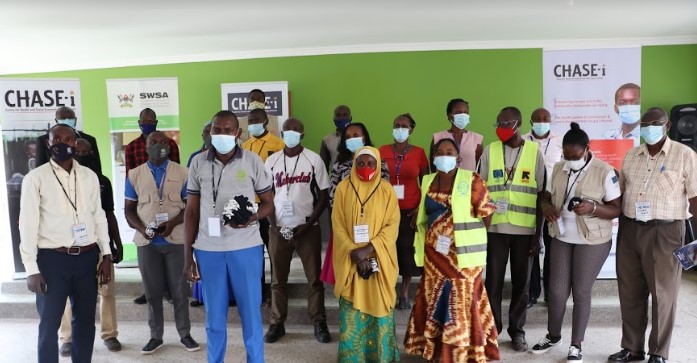
Photo: Local leaders, implementing partners, study team and government officials pose for a group photo after the REFLECT Study dissemination within Kyaka II Refugee Settlement in Kyegegwa district
Makerere researchers and local leaders have asked government and other key stakeholders in refugee management to address community drivers of non-compliance to COVID-19 guidelines as increased cases continue to be registered across the country.
This call was made at the dissemination event of a study conducted by Makerere University. The study is titled Refugee Lived Experiences, Compliance and Thinking (REFLECT) in COVID-19. The REFLECT dissemination was undertaken in multiple sites Kisenyi (Kampala), Kyaka II Refugee Settlement (Kyegegwa) and Adjumani (West Nile) on 14th December 2020.
The REFLECT study observed that compliance levels around COVID-19 guidelines drastically declined between May-August 2020 and continue going down despite increased infections from community transmission. The stakeholders at this event cautioned that addressing the drivers of non-compliance was necessary in light of the overwhelmed health system, currently ongoing political campaigns and massive social gatherings in the upcoming Christmas season and beyond.
Since March 2020 the Uganda government and its partners have conducted a fairly successful awareness campaign on the prevention of COVID-19. However, this knowledge has not translated into sustainable behavioural change and while there was strict observance of COVID-19 at the start of the pandemic, compliance has drastically dropped due to a number of reasons. This is why all prevention efforts should now focus on addressing the barriers to non-compliance as the country enters into the second wave and peak period of COVID-19 transmissions.
A study conducted from among 2,092 people in refugee settlements in Uganda has found a serious disconnect between the high knowledge levels and levels of compliance with the recommended COVID-19 preventive measures. A total of 13 settlements were considered for this study including Kisenyi in Kampala, Kyaka II in Kyegegwa district and 11 settlements in Adjumani district, West Nile.

Presenting findings of the study at Kyaka II Refugee Settlement in Kyegegwa, South-Western Uganda, the research team led by Dr Gloria Seruwagi observed that compliance levels had declined over time (between March/April and July/August); unfortunately coinciding with increasing number of COVID-19 cases and deaths.
Inappropriate use of masks was found prevalent in some of the study sites – including sharing of masks, and only wearing them when the refugees meet the police. Researchers say these practices constitute a source of risk for infection, rather than being protective.
Scarcity of Facemasks
Sifa Mubalama, a Woman Councillor in Kyaka II while speaking to study investigators at Kyaka II Refugee Settlement in Kyegegwa, South-Western Uganda late last year, revealed that there is non-compliance to COVID-19 guidelines due to inadequate masks and materials at the settlement.
“We were all given one mask each in Kyaka II settlement which you have to wash often and use again, hence becoming too old getting torn after some time. There is also inconsistent supply of soap and water. Because of this, some of the community members have not been washing their hands consistently’’ Mubalama revealed.
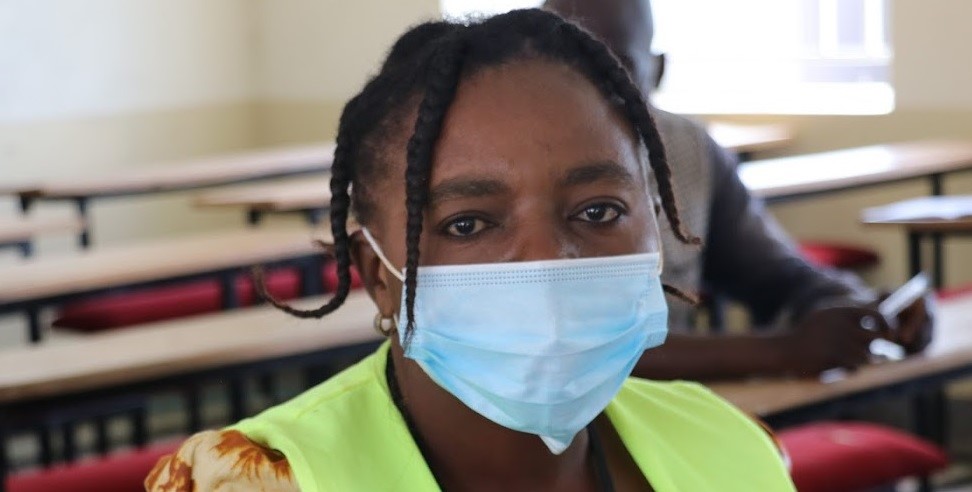
According to Mubalama, each family gets Shs. 22,000 every month, which is she says is not adequate to sustain the families. As a result, majority refugees go out in the communities to do manual work, to supplement on the income citing that this puts their lives at risk of COVID-19 infection.
Mubalama further contends that children in the settlements were not adhering to the Standard Operating Procedures (SOPs) because their parents were not.
“It would be easier to implement these guidelines if the parents were adhering to them. Because the parents are not adhering to the guidelines, most children are also not. It’s really important that if we are to implement the SOPs, it should start from the parent,” she said.
According to Happy Peter Christopher, the Kyegegwa Sub County Speaker, ever since the lockdown restrictions were eased, the refugees abandoned following the COVID-19 guidelines like social distancing, wearing masks, sanitizing or frequent washing of hands with soap.
“People are not putting on masks and are careless. Refugees also buy food from the nationals and there are intermarriages. So, the spread of COVID-19 is very possible. For us we would like, if possible, to ask government to bring back the total lockdown so that we are protected”.
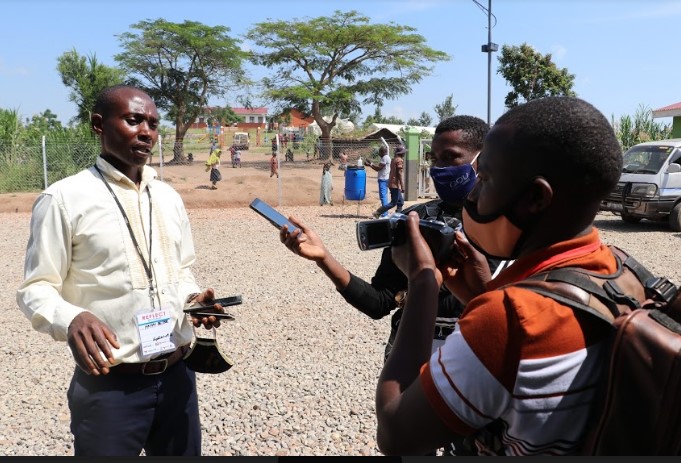
He also reported that, up to now, some areas in Kyegegwa had still not received the government distributed masks and called upon government to deliver masks to all refugees and also add more efforts in enforcing SOPs.
It is against this background that researchers at Makerere University and local leaders have appealed to government and other stakeholders in the refugee management to address the community drivers of non-compliance to COVID-19 guidelines as cases continue to surge in Kyaka II refugee settlement in the South Western district of Kyegegwa.
Government has been asked to address the drivers of non-compliance, as a necessity in light of the overwhelmed health system, by the currently ongoing political campaigns and the massive social gatherings during the festivities.
Dr Misaki Wayengera the Chairperson of the Scientific Advisory Committee on the COVID-19 Taskforce in the Ministry of Health explained why some districts did not get enough masks, saying there was an urgency to distribute to candidates returning to school.
“We intended to distribute masks to the entire 139 districts of Uganda. However, this was not possible because we opened up schools. As the Ministry [of Health], we had to negotiate with the Ministry of Education to prioritise the candidate students who were going to school; every student receiving 2 masks. As a result, we have not been able to distribute masks across the entire country,” he explained.
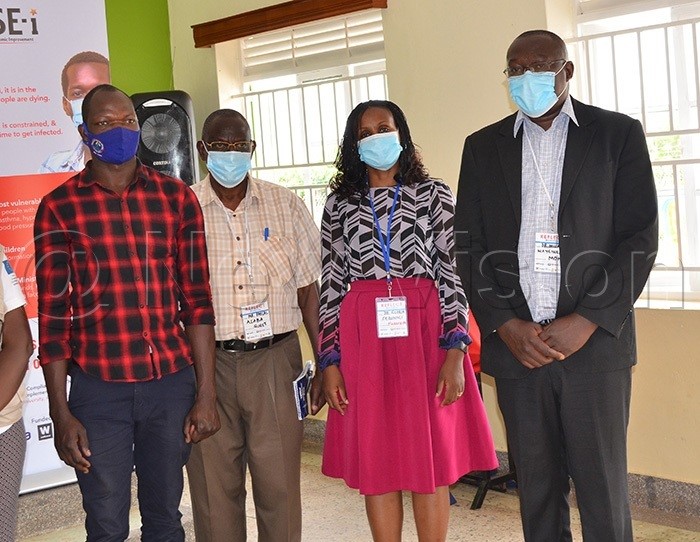
According to Dr. Wayengera, there is a need for all stakeholders dealing with refugees to appreciate that they are equally susceptible to COVID-19 like any other person.
“In terms of providing support, we must ensure that we provide things like masks, soap, sanitizers and also educational materials around the SOPs,” he said.
Adding that; “there are targeted efforts to make sure that we roll out Rapid Diagnostic Tests to make sure that we can screen the populations especially as children go back to school, we screen them but most importantly know who is infected and pull them out from the community”.
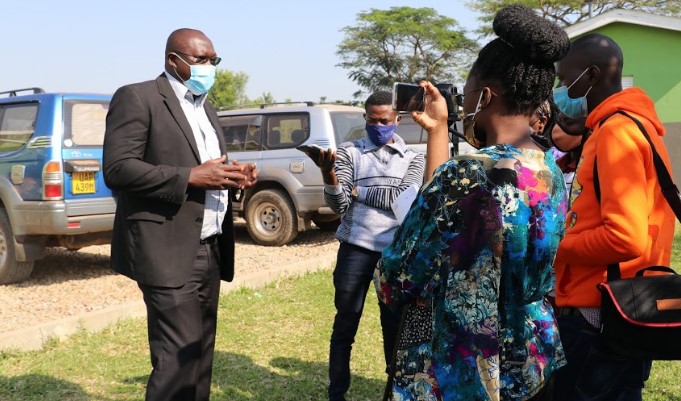
Discussion of Study Results
Dr Gloria Seruwagi, also the Principal Investigator notes that whereas more than half (about 60 percent) of the members of the refugee community are well informed about COVID-19; up to 40% were found to have knowledge gaps on the nature, transmission, symptoms and dangers of COVID-19.
The study results also showed that between 1-40% of the refugee population across the different study sites adopt at least one risk behaviour likely to lead to transmission of COVID-19 including behaviours related to hygiene and social interactions including related to hygiene, congestion, and physical activity.
While men appeared more knowledgeable about the virus compared to women and children, women were found to be more compliant than men. Also, refugees who were Muslims were more compliant to COVID-19 guidelines compared to their Christian counterparts while younger refugees appeared more knowledgeable about COVID-19 than the elderly.
A wide knowledge gap was found among the children and adolescents, with up to 75% not fully knowledgeable on causes, transmission, risk/protective factors and management of Covid-19.
The Myths
Study results show that refugee communities had a belief that Africans have immunity against COVID-19; and that COVID-19 is not real but is instead a fabrication of scientists and politicians; and that their religious faith would protect them.
On threats and opportunities towards compliance, social media and the diaspora were reported as the key knowledge agents among refugee communities whose effect is divisive by simultaneously encouraging both compliance and non-compliance.
While a lot of information about COVID-19 has been provided by government and other stakeholders including implementing partners from civil society, UN bodies and local leadership, researchers revealed that children, youths and s the elderly and people with disabilities were not particularly targeted with appropriate information; and had largely not been reached.
Children and COVID-19
During the investigations, researchers found that despite government and other key and agencies churning out COVID-19 related information, it largely focused on adults and missed out children and adolescents.
“The fact that they (children and adolescents) have not been targeted means that no one has even given them masks. The masks which are on the market are all big and if a child wears it, it is going to fall down. We decided to channel some of the study resources into making customised and re-usable masks for some of the older children,” explains Dr. Gloria Seruwagi.
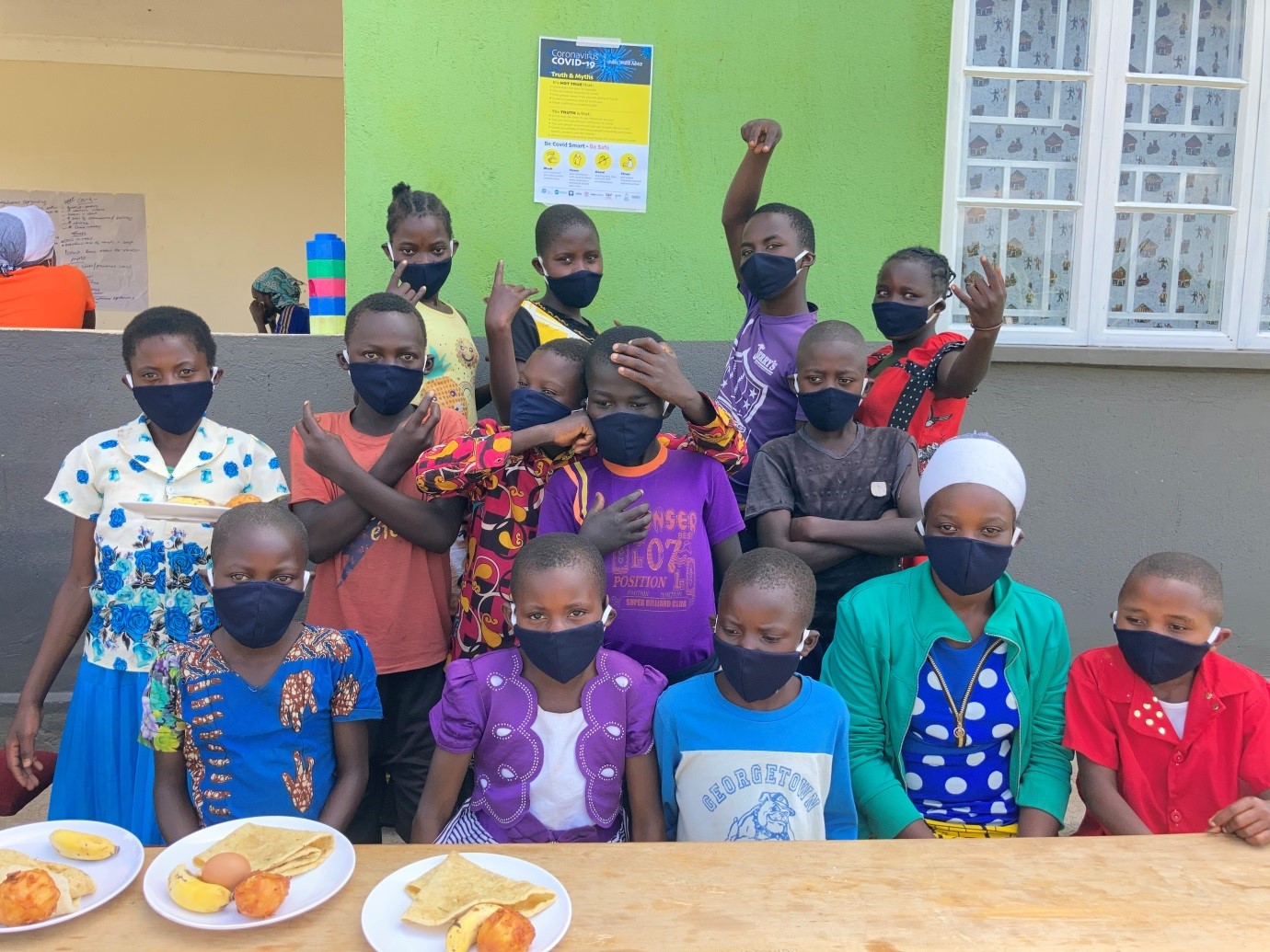
Behavioural change messages needed
The REFLECT study team observed during the study that there was a great and urgent need for engaging leadership at all levels as well as developing Behavioral change messages to positively influence behavior.
During the dissemination exercise, the REFLECT Study Team donated masks to support the refugees “walk the compliance talk” in the fight against COVID-19.
The study team physically sensitised and demonstrated to the refugees on proper wearing of masks. They strongly discouraged the improper use of masks including “chin” masking, partial masking, inconsistent masking, sharing of masks as well as wearing ill-fitting masks.
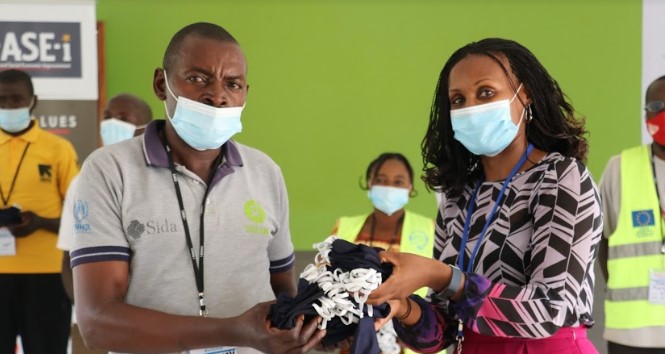
On the whole, researchers applauded government and development partners’ efforts on undertaking a largely successful awareness campaign around COVID-19.
They note however that this awareness has not translated into positive change, emphasising the need for more effort towards behavioural change, building on from the COVID awareness campaign.
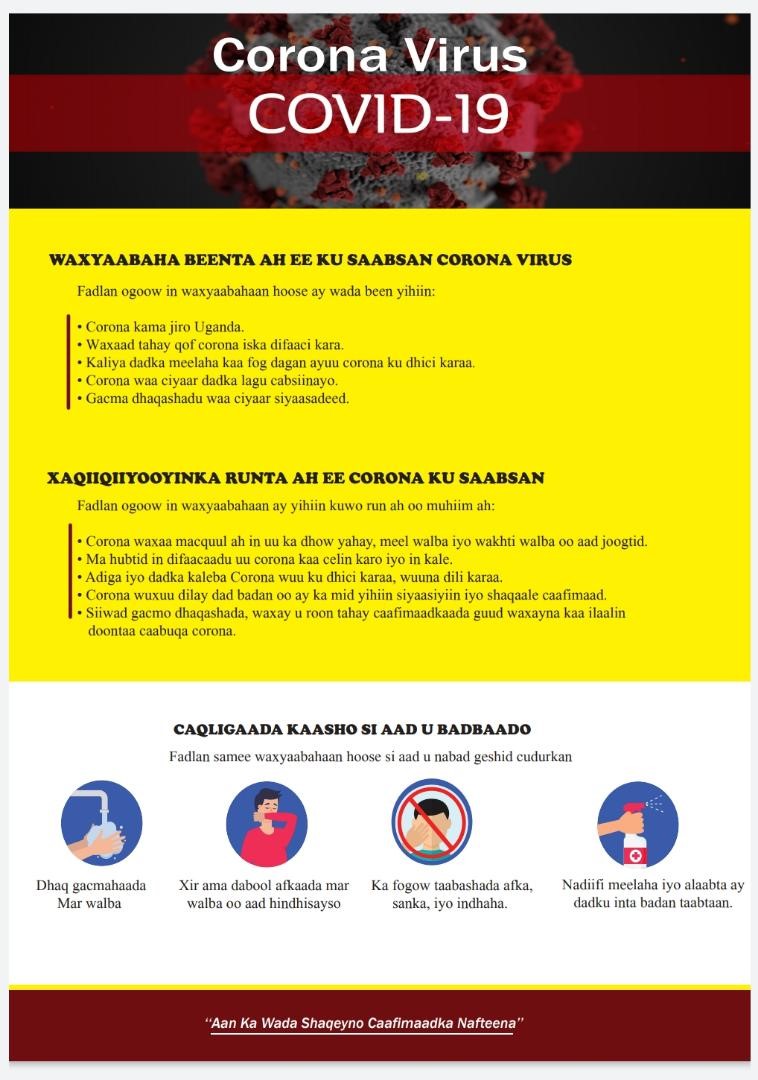
The research team recommends thus;
- Government and all stakeholders should focus on addressing the drivers of non-compliance and enforcement fatigue. These drivers include:
- Reviewing the feasibility of interventions: Guidelines like physical distancing are not feasible in crowded refugee settings and need to be revisited. For crowded settings emphasis needs to be put on some guidelines and not others, for example handwashing and consistently wearing fitting face masks instead of physical distancing or sanitizing.
- Debunk myths and negative perceptions: Majority of the community has not fully bought into the seriousness of COVID-19 and think it is not only a joke but is also a political and monetary ploy advanced by politicians, some scientists, supremacists or population control enthusiasts. These myths need to be debunked and instead replaced with factual information about COVID-19.
- More profiling of COVID-19 trends and cases should be undertaken for behavioural change impact. This is because more than 90% of study participants had not seen a single COVID case. However, stigma and other potentially related dilemmas should be carefully managed.
- Leaders, implementers and enforcers of COVID-19 guidelines should be consistent and “walk the talk”. This is especially needed now with the political campaign season where masses are gathering and politicians are not leading by example.
- The issue of livelihoods and food security must be resolved as a key bottleneck to compliance.
- Culture: Local leaders, cultural leaders and grassroots organisations should be recognised and engaged more in behavioural change campaigns – for instance to engage their communities identify alternative social norms for greetings, for showing love and kindness etc., without put their lives at risk.
- The timeliness and critical role of the recently launched 2020 Community Health Engagement Strategy (CES) should be leveraged whereby:
- Local health system capacity is strengthened to effectively take up the implementation and enforcement of SOPs for COVID-19 prevention.
- Community health systems and other enforcement structures are equipped with knowledge, skills, supplies and adequate infrastructure.
- Key sociodemographic factors and COVID-19 risk should guide tailored impact messaging and other interventions.
- Children, adolescents and youth should be effectively targeted in COVID-19 interventions. They need awareness, products (e.g. fitting face masks), visibility, voice and protection from the effects of COVID-19 including being witnesses and victims of different forms of violence.
- The awareness message found high among adults should be reinforced and consolidated – equitably this time.
“We believe that these are low-cost interventions but which will bring about high impact in a very short time and reverse not only the trend of COVID-19 transmission but also its negative effects across the health socioeconomic spectrum” Dr Seruwagi said.
Kyegegwa Authorities Speak Out
Jethro Aldrine, the Kyegegwa District Assistant Resident District Commissioner said government was committed to inclusive dissemination of information on MOH SOPs in order to mitigate the spread of the pandemic.
"As the COVID-19 district task force, we move from door to door to sensitize people on COVID-19 including children," he disclosed.
He also noted that government was also sensitising the masses through radio stations to create awareness that COVID-19 is real and needs to be prevented. He thanked the REFLECT Project for carrying out the study that will help the district fight the current pandemic.
At a radio talk show conducted jointly with the study team, district officials and refugee community leaders, Mr Thomas Mugweri the Surveillance Officer in the District Health Office of Kyegegwa District Local Government also thanked the REFLECT Study Team for giving it new direction.
“While we as a district have been massively sensitizing on awareness, now we know that people are not using the message they know about COVID. We are now going to start using all our behavioural change techniques to make sure that we bring out the desired behavioural change,” observed Mugweri
He urged the politicians to stop recklessly endangering the masses by calling them to campaign rallies and instead called upon them to donate masks and lead by example through observing COVID SOPs during their campaigns.


Youth Voices on COVID-19 in Refugee Settings
As part of increasing the visibility and voice of young people in COVID-19, the REFLECT Study organised an engagement session with children, adolescents and youth during the dissemination. The engagement sessions were led by Francis Kinuthia Kariuki and Grace Ssekasala of Centre for Health and Social Economic Improvement (CHASE-i) who were supported by Catherine Nakidde Lubowa and Dr Gloria Seruwagi the study PI.
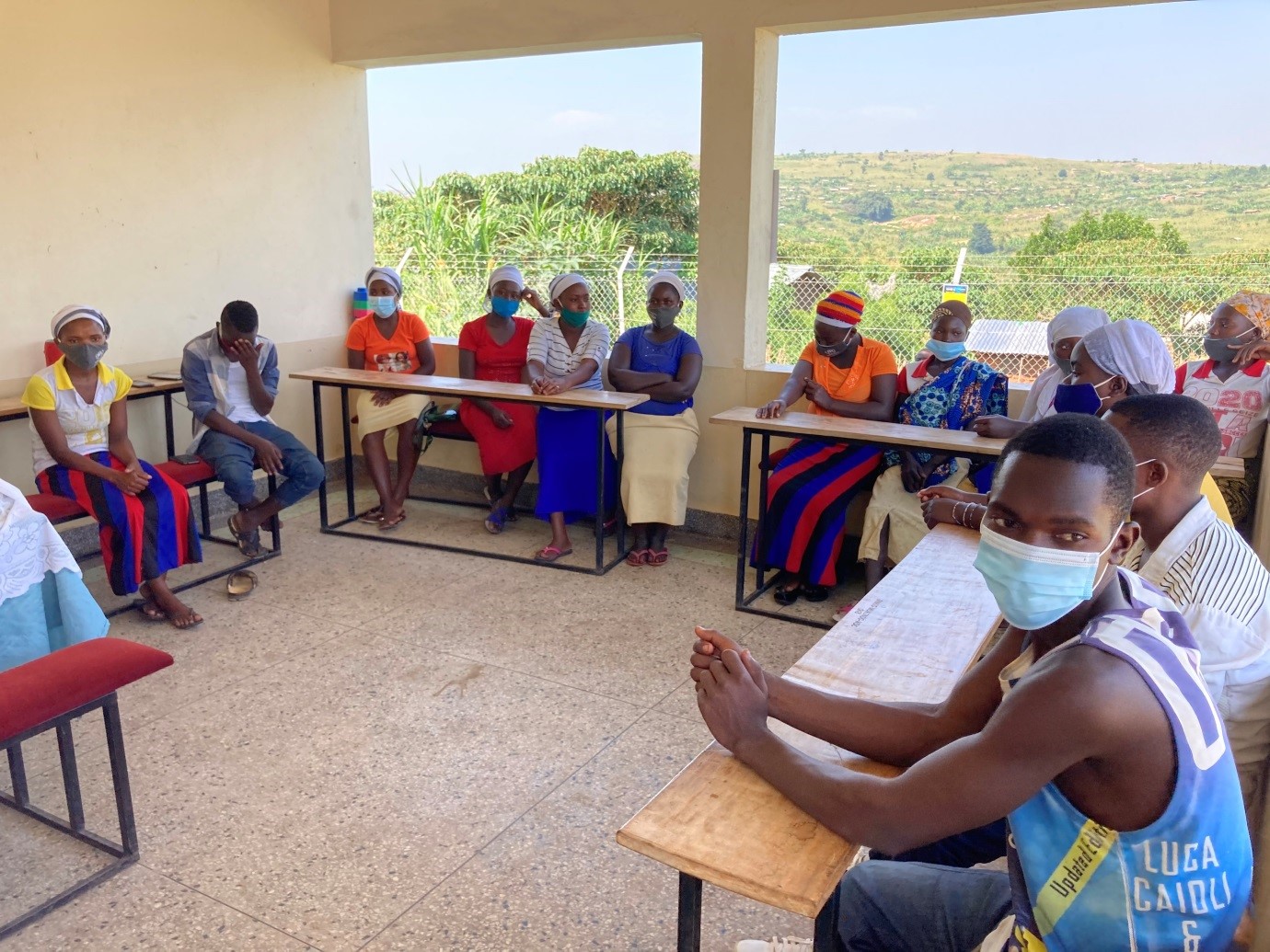
During this exercise, the REFLECT Team discussed Coronavirus and it emerged that a number of issues are affecting the children and youth which needed to be addressed alongside COVID-19 prevention. Most critical, children and adolescents reported defilement, rape - leading to teenage pregnancies and a lot of other SRH challenges that affected their sexual health.
Many confessed they lacked information on menstruation hygiene products which citing that some of their families could not afford. Others decried inaccessibility of contraception despite being sexually active and access to youth-friendly counselling on SRH matters affecting them.
Both male and female youths agreed that the high level of teenage pregnancies has been attributed to high poverty levels and being out of school. ‘’Sex is being used as a tool for economic gain and survival. This is not limited to the girl child only - two cases were reported where boys are being married by older women who lure them with money and soft life’’ explained Mr. Francis Kinuthia from his engagement with adolescent boys and youth.

Mental health issues were reported to be affecting adolescents largely boys who expressed worry about their future especially, now, that schools had been closed, and they are in a foreign country.
Increasing crime rates were also reported and, following unemployment plus school closure, majority youths especially males have now resorted to drugs and substance abuse.
In regard to COVID-19 the adolescents in general reported that they had experienced the negative effect of the pandemic in their lives such as reduction on monthly hand-outs, harassment by police and enforcers of COVID -19 guidelines, increased domestic violence, SGBV, teenage pregnancy, increased levels of drug and substance abuse, poor mental health and high cost of living among others.
Asked what could be done to solve some the challenges they were facing; youth recommended the following;
- Establishment of skill development centres to empower them and make them less dependent on hand-outs
- Creation of employment opportunities by authorities
- Identification, support and nurturing talent among them refugees and youths
- Constant supply of sanitary towels/pads and other SRH products including contraception
- Health education on contraception methods and having in place youth-friendly services at health facilities
- Continuous awareness campaign on COVID-19 which involve youth and punitive policies or by-laws to severely punish the perpetrators of teenage pregnancies, rape and child marriages.
The dissemination attracted members of the academia from Makerere, Gulu and other universities, central and district Government representatives, Refugee Representatives including their leadership from OPM, Refugee Welfare Committees (RWC), Village Health Teams (VHT), Youth, Women and Sub-County representatives, local politicians, Development and Implementing Partners like Save the Children, Red Cross Society, UNHCR, Nsamizi Institute for Social Development and the Private Sector.

Research Team
The REFLECT Study is funded by Elrha/R2HC (Research for Health in Humanitarian Crises) supported by UKAID, Wellcome and National Institute for Health Research (NIHR). The Study Team is led by Dr. Gloria Seruwagi.
The full team has Prof. Stephen Lawoko of Gulu University, Dr. Denis Muhangi, Dr. Eric Awich Ochen, Dr. Betty Okot all from Makerere Universit, Andrew Masaba of Lutheran World Federation (LWF), Dunstan Ddamulira from Agency for Cooperation and Research in Development (ACORD and John Mary Ssekate from the National Association of Social Workers of Uganda (NASWU) Others are Brian Luswata and Joshua Kayiwa all from the Ministry of Health and Catherine Nakidde Lubowa, the Project Coordinator.
Written by Joseph Odoi

